During July-August 2004, three superb motion picture composers died. That prompted my piece about the trio in my Kansas City Kansan column, Crum on Film, first published on August 25 that summer. It is reposted here.
By Steve Crum
Imagine movie legends Clark Gable, Katharine Hepburn, and Humphrey Bogart dying with the same month. (They actually passed away years apart.) Essentially that sad coincidence has occurred in the world of movie music. Three superstar film composers have died within the last few weeks: Elmer Bernstein (Aug. 18), Jerry Goldsmith (July 21), and David Raksin (Aug. 9).
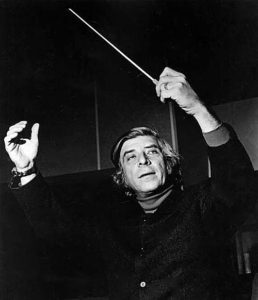 ELMER BERNSTEIN
ELMER BERNSTEIN
To the general public Elmer Bernstein will forever be known through his theme for 1960’s The Magnificent Seven, which during the years preceding 1971 was also the Marlboro Cigarettes theme in commercials.
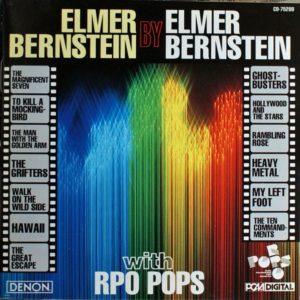
1971 was the year TV banned cigarette ads. Bernstein (no relation to Leonard) began his career as a protégé of American classical composer Aaron Copland. Bernstein’s scores for radio and TV shows led to his first significant movie score, The Man with the Golden Arm (1955). It was jazz, and uncharacteristic. Then again, Bernstein’s scores were always varied in style, always superb. His only Oscar win was for Thoroughly Modern Millie (1967), another sound entirely. Then there was 1963’s The Great Escape soundtrack. Think Steve McQueen on that motorcycle.
The brilliant Elmer Bernstein was the Mr. Variety of film music. Consider (among his 253 film scores): The Ten Commandments, National Lampoon’s Animal House, Far From Heaven, My Left Foot, Airplane!, The Shootist, Baby the Rain Must Fall, The Hallelujah Trail, True Grit, and Sweet Smell of Success.
My favorite among them all: To Kill a Mockingbird from 1962.
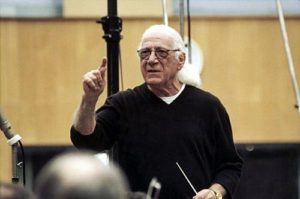 JERRY GOLDSMITH
JERRY GOLDSMITH
Goldsmith also began as a classical music student, and soon segued into CBS radio. There he wrote scores and incidental music to hundreds of radio and TV shows 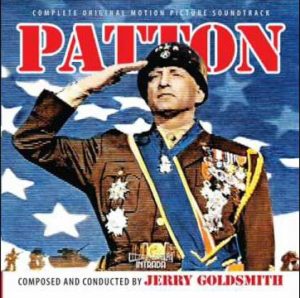 beginning in the early 1950s. His music for The Twilight Zone led to Boris Karloff’s macabre Thriller series. Twentieth Century Fox’s composer-in-residence, Alfred Newman, signed Goldsmith soon after.
beginning in the early 1950s. His music for The Twilight Zone led to Boris Karloff’s macabre Thriller series. Twentieth Century Fox’s composer-in-residence, Alfred Newman, signed Goldsmith soon after.
Three hundred movie soundtracks later, Jerry Goldsmith’s unforgettable scores are more listenable than ever. Among the best: The Blue Max, The Sand Pebbles, A Patch of Blue, Planet of the Apes, Patton, Star Trek: The Motion Picture, The Omen (his only Oscar winner), Hoosiers, Our Man Flint, Lilies of the Field, Rudy, Poltergeist, and the TV theme from The Man from U.N.C.L.E.
My favorite Jerry Goldsmith score: The Boys from Brazil.
DAVID RAKSIN
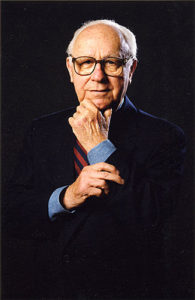 With 170 TV and movie scores, Raksin is lesser known than Bernstein or Goldsmith. Yet with one movie score, he will forever ben remembered: Laura (1944). The Otto Preminger directed movie is about a detective (Dana Andrews) falling love with a missing woman (Gene Tierney) shown in a painting. Raksin had to create and sustain a haunting mood. Without the music, which dominates the story, Laura would not be the classic film it is.
With 170 TV and movie scores, Raksin is lesser known than Bernstein or Goldsmith. Yet with one movie score, he will forever ben remembered: Laura (1944). The Otto Preminger directed movie is about a detective (Dana Andrews) falling love with a missing woman (Gene Tierney) shown in a painting. Raksin had to create and sustain a haunting mood. Without the music, which dominates the story, Laura would not be the classic film it is.
The theme was so popular that lyrics (by Johnny Mercer) were added after the film’s release: Laura is the face in the misty lights/Footsteps that hear down the hall….
On an April Saturday in 1989, David Raksin was my teacher for five hours during a film class I was taking at the Doubletree in Overland Park, Kansas. He flew in that morning from the West Coast 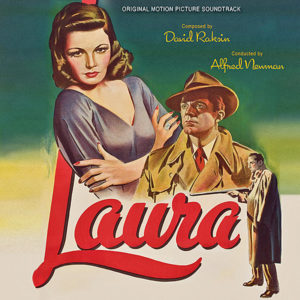 where he was teaching film music course at USC. He was a bit gruff, but very learned.
where he was teaching film music course at USC. He was a bit gruff, but very learned.
The grey-haired, robust Raksin spoke of his early days with George Gershwin. He recalled his collaboration the legendary Charlie Chaplin in creating the score for Modern Times and its bittersweet theme song, Smile. (Smile though your heart is aching/Smile even though it’s breaking.) “I’m not so elaborate in theories,” he said. “I just sit down and write a few notes.”
To illustrate that film is “an art of components,” Raksin first ran a scene from Laura without any music. Then he replayed it with his score. Of course, the dramatic effect of the latter was tremendous.
“Music has to say something,” Raksin said, “to assert itself.” In addition to Laura, Raksin’s melodies asserted themselves in films from 1936, including: The Adventures of Sherlock Holmes, Suez, Smoky, The Secret Life of Walter Mitty, Forever Amber, Daisy Kenyon, The Bad and the Beautiful, and the theme to TV’s Ben Casey.
“To be a successful film composer,” Raksin told me during a break, “takes guts, a gift, and the ability to educate oneself.”
What a defining remark for Raksin, Goldsmith, and Bernstein.

great article as always…..